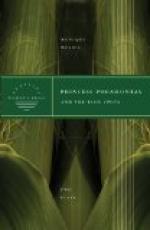This the zealous and gentle minister of the Gospel gladly consented to do. Here was the great opportunity he had desired since his coming to Virginia—to make an Indian convert so notable that this conversion might bring others in its train. Moreover the maiden herself interested him. But it was not so easy to go about it. Pocahontas’s knowledge of English did not extend beyond the simplest expressions; and he found it necessary to translate the long and abstruse theological dogmas into familiar terms. He had almost despaired of making her comprehend until he recalled how his Master had taught in parables. So he retold the incidents of His life in stories which held the Indian maiden spellbound. He showed her pictures in heavy leathern-bound volumes, and tried with less success to explain the meaning of the daily religious services he conducted in the church.
“Why do ye put always flowers on that table?” she asked, pointing to the vases on the altar which the Governor bade keep always filled with fresh blossoms as long as the forests and river bank could supply them. “What good hath thy god of them?”
“Dost thou not take delight in the sunshine. Princess?” replied the priest as they sat in the cool shade of the darkened church looking out through the open door at waving green branches and the river beyond. “I have beheld thee lift up thine arms on a fair day when the swift white clouds moved across the blue heavens as if thou wouldst embrace the whole wide earth. Why dost thou take pleasure in such things?”
“Because,” hesitated the maiden, seeking for a reason, “because they make me happy.”
“Because,” he added, “they are beautiful. And God who created all this beauty rejoiceth too in it—in green fields and noble trees, in lovely maidens, strong men and happy children. Therefore, in token thereof, we place beautiful flowers upon His table.”
“And delighteth he not in incantations of shamans and jossakeed (inspired prophets) and in self-torture?” she queried.
“Nay,” he answered; “such things are of the Devil; our God is love. Ponder upon the difference.”
And Pocahontas did think much of what he told her. Her spirit was maturing in this new atmosphere like a quick-growing vine climbing higher each day. Dr. Whitaker’s own fatherly kindness to her and to all the colony became for her the symbol of the tenderness of the God of whom he taught her. Then, too, this strange new deity was the god of her Brother, John Smith; and whatever in any way was dear to him she wanted to make her own.
For weeks the instruction continued and at last Dr. Whitaker told Sir Thomas Dale that he believed the Indian princess was now sufficiently impressed with the teachings of Christianity to be baptized. So Sir Thomas, meeting her one afternoon as she stood by the wharf watching men unload a ship but newly arrived from England, began:




